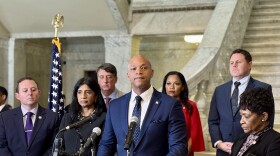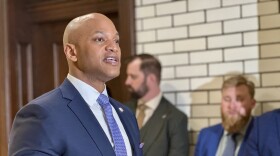The Maryland House of Delegates gave initial approval to the state budget and its companion bill, the Budget Reconciliation and Financing Act, following nearly seven hours of debate Tuesday.
The budget closes a roughly $3 billion deficit and includes several new taxes expected to raise more than $1 billion in new revenues.
Throughout the lengthy debate, Republicans offered almost two dozen amendments, most of which attempted to reduce proposed tax increases or cut additional spending. The chamber’s Democratic majority voted down all of the amendments, but often not without heated arguments.
One omnibus amendment sponsored by House Minority Leader Jason Buckel included cuts to a clean energy program, public education, government worker salaries, and Medicaid.
The amendment’s education cuts totaled more than $480 million and included services for children with disabilities, expanded public pre-kindergarten, and grants to schools with high concentrations of students from low-income households.
Specific cuts to Medicaid coverage included gender-affirming care; emergency medical care and pregnancy-related care for immigrants; dental services for low-income adults; and reimbursement rates for long-term care providers. The amendment also would have removed some people from Medicaid eligibility, and specifically from the Maryland Children’s Health Program.
“Those all may be nice and good things,” Buckel said about his proposed cuts to healthcare funding. “You cannot afford them without massive tax increases.”
House Appropriations Committee Chair Ben Barnes, a Democrat representing parts of Anne Arundel and Prince George’s counties, said Buckel’s amendment demonstrates a difference in values between Republicans and Democrats.
“Because we would rather tax millionaires a little more so that students with disabilities can get the services they need,” he said. “Because we would rather take a little cut to tourism, rather than a cut to every kid in this state or families who need Medicaid.”
Other points of contention included plans to shift more teacher retirement costs from the state to local jurisdictions, to raise the excise tax, and to add a new 3% tax on data and information technology services.
The proposed changes to vehicle titling fees and the excise tax are necessary to help pay for transportation infrastructure, said House Environment and Transportation Committee Chair Marc Korman, a Democrat from Montgomery County. He highlighted projects across the state that will benefit from the funds, including rehabilitation of Baltimore City’s light rail vehicles.
“It's millions of dollars to all the state highway districts that we're all emailing all the time and calling with our constituents’ complaints about trash on the side of the road and potholes that need to be filled,” Korman said. “It's millions of dollars for our port and our airport, which do in most years, take care of their own operating costs, but not their own capital costs.”
House Minority Whip Jesse Pippy proposed an amendment to remove some services from the proposed data and IT tax in an effort to lessen the impact on businesses — “our job creators, the engine that, hopefully one day, will prevent us from having another deficit.”
Like the others, his amendment failed.
The House is scheduled to take a final vote on the chamber’s version of the budget and the Budget Reconciliation and Financing Act Wednesday. Meanwhile, the Senate is likely to take up its version in the coming days.










